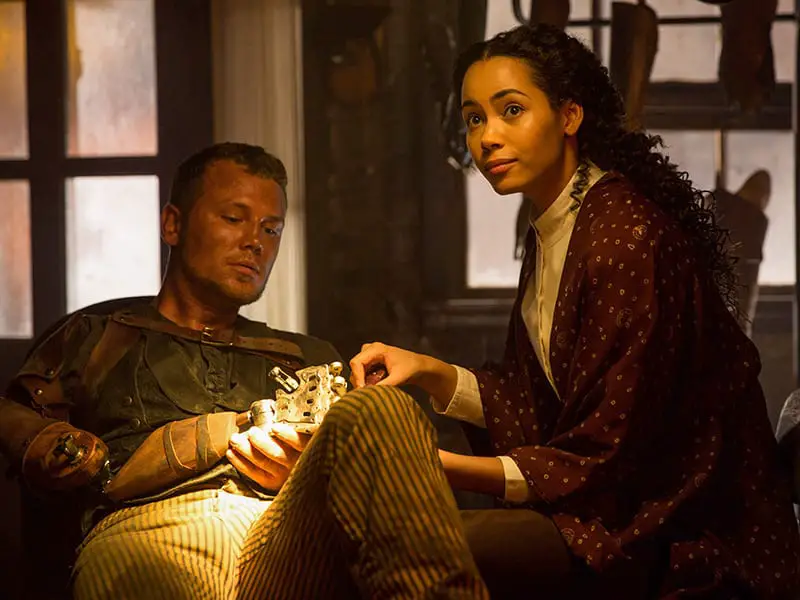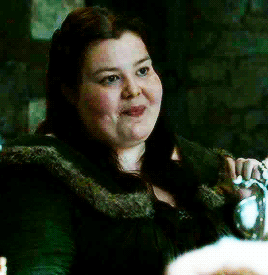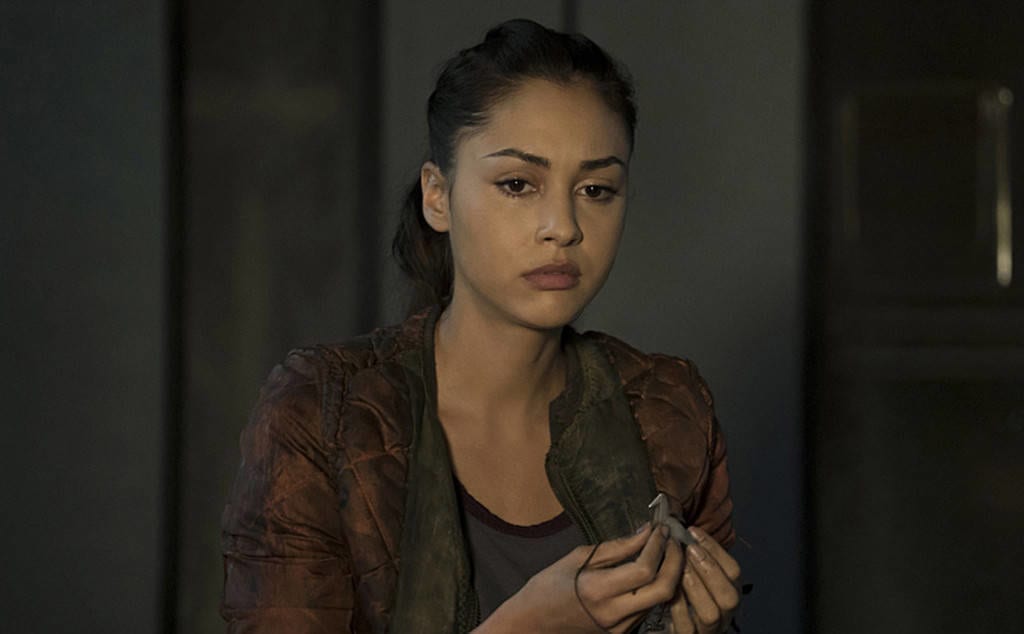This is it, the movie is almost over. With only ten minutes left in the film, the hero is literally hanging by their fingertips from the edge of a building. The villain laughs, grinds their heels into the hero’s fingers, and, unable to maintain her grip through the pain, she falls. We watch her plummet, the ground rushing upward. She has no parachute, grappling hook, or zip line to save her. What is she going to do?!
The answer? Nothing. At the last second, her sidekick that she thought was dead not only wasn’t dead but had stolen a helicopter from the villain and showed up to rescue her. What a save, right? You’ve just been the victim of a deus ex machina.
But what about when dark stories get even darker by hurting vulnerable people? Or when a good character get’s ‘punished’ by the narrative for nothing more than being a good person? Grimdark and nihilistic stories in particular seem to go out of their way to bring evil into the lives of their most morally pure or innocent citizens.
I call this phenomenon the ‘daemon (demon) ex machina’. Both because diabolus ex machina was already taken, and because there’s a degree of malice in such storytelling that’s more than a plot convenient downturn. But before I dive into it’s darker narrative cousin, let’s take a step back and look at the deus ex machina.
Good Things Happen to Good Heroes
Once a feature of Greek tragedy, the deus ex machina—translated “god in the machine—referred to sudden, unexpected intervention of the gods to rescue the protagonist from their fate. In stage productions the deity would literally descend from the ‘heavens’ via a mechanical contraption lowered to the stage, hence the “ex machina” part of the deus ex machina. The behind-the-scenes mechanics were visible to the audience, even if acceptable given the limits of stage production.
Nowadays, the deus ex machina trope uses fewer machines but the same sudden, unexpected deliverance. Often, a storyteller has written themselves into a corner whereby there’s basically no way out other than either literal or metaphorical ‘divine’ intervention of some sort. Saved from a nasty fall by the presence of a conveniently placed tree. A character unskilled in firearms makes a million to one shot that even a trained sniper couldn’t pull off. Yet the audience can see the contrivance necessary to bring about the last-minute salvation just as much as in the Greek tragedies.
The most important feature of a deus ex machina is the lack of set up, logic, or coherence to the last minute rescue. Nothing in the narrative could predict the 11th hour save, nor could the characters themselves. It’s a magically convenient solution to an otherwise unsolvable or hopeless situation. Whether random chance, karma, or literal divine intervention, the deus ex machina is an external solution, as opposed to one that arises from characters and their choices.
Put simply, a deus ex machina is a sudden, unexpected, and external solution to an otherwise hopeless or unsolvable problem in the narrative. The hero’s in a jam, and they have to win, so good things happen out of nowhere.
There’s No Room for Good People in a Nihilistic World
What I’m calling the daemon ex machina isn’t exactly the mirror opposite of the deus ex machina. Bad things happening to good people is, after all, the basis of many a hero’s journey. Narrative complications happen, stuff goes down, and the hero has to step in. Nor is it necessarily when the villain survives to fight another day because otherwise the story would be over. Bad things sometimes happen because the plot needs them to in order for it to continue. This is what is referred to as the diabolus ex machina, the ‘devil’ of plot contrivance.
Now, what I’m talking about is more than ‘dramatic necessity’. It’s the way Dark and Gritty™ stories seem to thrive by shoving characters with the most honor, integrity, or compassion (sometimes rather gleefully) under the bus. This isn’t just narrative complication, it’s malevolence, and it’s just as contrived as a hail Mary or a sudden tragedy to complicated the hero’s life.
Sometimes, the degree to which the negative consequences for being a good person in a nihilistic world affect the character feels like a punishment. As if being a decent human being in a crapsack world when everyone else is a jerkwad means they deserve disproportionately awful things to happen to them.
Like Veil in season 2 of Into the Badlands. In an oppressive, dystopian setting like the Badlands, Veil is an unexpected bright spot. She’s hopeful, intelligent, gentle, and caring, all useful skills in a physician for the underprivileged. Her compassion defines her to the point that she’s willing to spare the life of the man who killed her parents because she takes her position as a healer seriously.

And yet, the narrative piled awful thing after awful thing on top of her this past season, so much so that I plan on writing a whole separate post on her treatment. She’s imprisoned, psychologically tortured, and physically threatened repeatedly by the man whose life she spared. He threatens her life, the life of her baby, and her freedom if she does not continue to keep him healthy. All the while she must put up with his increasingly aggressive sexual advances. He goes so far as to force her to marry him and almost rape her before she’s rescued by her lover and the father of her baby.
Since all of this is the result of sparing Quinn’s life, one could reasonably conclude that her compassion got her here. Were she more hardened, more willing to kill, less empathetic and gracious, she would not have suffered so. Her compassion gets her imprisoned and tortured and, spoiler alert, ultimately leads to her death. She’s literally killed because she’s a good person.
Grimdark narratives have a habit of killing or inflicting suffering on those who deserve it least. While there’s potentially a point to be made that the ‘innocent suffer most’ in a crapsack society, at what point does even that lose poignancy? We all know that innocent people suffer, even in our own society and, as bad as it is, it’s far from a nihilist’s wet dream. Yet Grimdark worlds take their cue from our own, so the most vulnerable in our world will be the most vulnerable in dystopian or otherwise Dark and Gritty™ worlds as well. This means children, women, and other marginalized groups.
Women and children especially take on the role of being compassionate, empathetic, and gentle in Grimdark societies, though it may fall to the person of color, as with Glenn on The Walking Dead. (Bonus points if you get two in one like Veil or Maeve from Westworld!) They will become the beacon of hope character, the voice of goodness, a shining light in a Dark, Dark world. And then they die. Or they suffer until they’re hopeless. Or they’re twisted into the same vengeful, nihilistic spirit as everyone else.
For me, ‘the innocent suffer most’ becomes a daemon ex machina when they are the primary targets for extreme suffering or unearned death. Or, when their suffering consistently exceeds that of the other characters in that setting. Yes, awful things happen when your world is a piece of crap. But the narrative should not go out of its way to target the innocent or decent people for disproportional suffering and violence.
Inflicting sexual violence, persecuting queer individuals, killing children, and otherwise targeting marginalized or vulnerable characters falls into this trope as well, even if they’re not necessarily the ‘best person’ on our screens. Once it reaches a critical mass, their pain becomes the sum total of their character. And for marginalized groups who are the targets of violence in our world, the situation often feels contrived for the sole purpose of inflicting yet more pain, just in narrative form.
Raven Reyes of The 100, for example, has been singled out from season 1 for a disproportionate amount of physical and psychological trauma compared to others on the show. Just like Veil on Into the Badlands, Raven’s pain has gotten to a point that it quite literally defines her character and arc. A reasonable argument could be made for Maeve from Westworld fitting this description. Yes, many of the hosts’ backstories involve trauma, but hers seems more than most. Plus, she has to relieve it over and over again as well as receive fresh trauma in the form of killing one of the people she most cares about accidentally.
I can’t talk about this without dealing with Game of Thrones, which seems to take particular glee in inflicting pain upon and tearing down all of its most positive characters. Viewers are forced to watch innocent children like Shireen and Rickon die gruesome deaths. But the beheading of actual villainous characters (or ones deemed so by the story) are moved offscreen for being ‘gratuitous’. The murder of an innocent woman, stabbed through her unborn baby, makes it onscreen, but the villain who raped, murdered, and flayed his way through the North has his supposedly narratively fitting death occur out of our line of vision.
Fat Walda, a perfectly kind, gentle, and overall good character gets more than her fair share of violence. She’s minding her own business, trying to be a pleasant, happy wife and productive mother while her husband bickers with his sociopathic son. Only to have herself and her newborn baby eaten alive by dogs just to ‘prove’ that Ramsay is Evuhl™. A narrative truth that somehow wasn’t proved enough when Ramsay flayed Theon, or raped Sansa, or killed his father, and Rickon and Osha and…You see where I’m going with this. “This world sucks and Ramsay’s a murderer” becomes the rationale for her brutal death, but it’s so clearly a contrivance to glorify the show’s villain du jur. That’s the daemon ex machina at work.

Sansa is a particularly good example of a character whose compassion and empathy are forced out of her due to the travesties visited upon her by the story. Formerly a gentle, kind girl who wept for her abuser, she is now a ‘hardened woman’ who serves up revenge with a smirk and seems to resent the only family she has left. Maeve falls into this as well, as her trauma sparks a quest for revenge that flies in the face of her earlier kindhearted concern for those around her.
The same could be said for example, of otherwise compassionate superheroes who take a downturn into Grimdark. Batman’s more Edgy™ persona in the Dark and Gritty™ Nolan reboots fits the bill compared to the campy TV show of the 60s and the 90s era empathy driven Bats. The teaser for S3 of Supergirl looks to be making a similar turn for Supergirl, though I’m desperately hoping that the world doesn’t go full Grimdark. Otherwise, it does feel like piling on darkness for the sake of tearing down a hope-driven, compassionate character under the guise of ‘honesty’.
Because the creators of such stories do seem to believe that Dark is more ‘honest’. They pile on emotional and psychological suffering to an otherwise good, kind, and compassionate character, but ultimately what is it for? Is the real, ‘honest’ world actually this awful? Sometimes, hopeful people exist and are not shat on by the world, but instead help the world be better. Sometimes pain makes them more empathetic and compassionate, not less. Supergirl, for example, was just this kind of hero in S1.
Let’s call a spade a spade and admit it’s suffering for the sake of being ‘dramatic’ or edgy. These storytellers are bringing in a sudden dose of Grimdark out of nowhere purely for the sake of piling on suffering to gain viewership. It’s the flip side to justifying violence against innocent characters in a Dark and Gritty world, but a similar impulse. After all, the heart and soul of the daemon ex machina is suffering as entertainment value.
Realism or Sadism?
Such a twisting of a formerly empathetic character is frequently justified by storytellers in the name of Realism™. The same excuse is often touted by those who utilize the suffering or death of innocents to highlight just how Grimdark and nihilistic their setting actually is. Good people don’t survive in a dark world, or so the assumption seems to be.
The trouble is, it’s rarely reasonable or proportional. When the world is crap, decent people don’t just suffer, they suffer most. Yes, terrible things happen to good people in real life. And the most vulnerable often are at the most risk of being harmed during war or under oppressive regimes.
At the same time, Game of Thrones, The Walking Dead, Westworld, The 100, and Into the Badlands are stories. They’re not real. They’re being crafted by a team of writers who are not being forced into writing the story they do. Content creators make choices. Veil didn’t have to suffer so much because of her compassion for Quinn. Glenn didn’t have to die because he’s a good person, or even because he died in the comics. Shireen didn’t have to die to prove Stannis was a jerk or Fat Walda to prove Ramsay was. Loras didn’t have to experience torture and die to prove the Faith Militant was Evil™. The writers made those choices, not the characters.

More to the point, disproportionally crapping on decent characters to ‘make a point’ (what point exactly? that your world is terrible? we know that) or to be Edgy™ veers awfully close to narrative sadism. In fact, there’s frequently no distinguishing the two.
In stories with awful societies, audiences will frequently latch onto the candle in the dark character. Few people enjoy piles of crap ad nauseum. They’re going to want some hope. Going out of your way to kill off or punish that character punishes the audience for identifying with or liking them. Call it a Shocking Twist™ if you like, but the delight content creators seem to take in destroying the few good characters in a Grimdark world is basically sadism. They enjoy inflicting pain on the good characters for being good and the audience for wanting good to exist.
They just happen to call it “dramatically satisfying” or “anyone can die” or “the innocent suffer most”. But at heart, the sentiment is maximizing entertainment value by causing the most pain to the character who will most cause the audience to have an emotional reaction.
In that sense, the daemon ex machina is ‘ex machina’ not so much in that it’s narratively unjustified. Grimdark can justify violence just merely a handwave at it’s own worldbuilding. The justification for violence is ‘this world sucks”, end of story. No, for the daemon ex machina it’s ‘from the machine’ in that you can clearly see the storyteller’s handiwork in actively punishing characters who are more uplifting or positive in their approach to the awful realities of their world.
When the narrative must contort itself or go out of it’s way to punish this character, or have that character act stupid in order for it to happen, the intent to hurt becomes even more obvious. A lot of ink has been spilled on this site about it, so I will only point out that this applies quite well to Sansa’s Northern plotline in S5-6. Marry for revenge? Really?
—
Thus, the daemon ex machina is more than a trope of convenience, as the deus or diabolus ex machina are. It’s a trope of malevolence, a seeking out of ways to inflict pain, suffering, or death on the characters who ‘deserve’ it least. While Dark, nihilistic societies may offer more forms of oppression for the most vulnerable in society, the daemon ex machina disproportionately dishes out tragedy and suffering on those who are not just innocent, but often honorable, just, compassionate, or kind. It’s a malevolent demon, not an impersonal narrative devil.
The weight of the pain often feels like a punishment for the character being a good person, where a more jaded or revenge-driven character would not have suffered as they have. In short, they don’t just suffer and are a good person anyway, they suffer because they’re a good person. If there’s one thing a Grimdark™ world cannot abide, it’s a decent human being to make everyone else look worse for giving into their less noble instincts.

